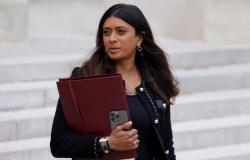Georges-Louis Bouchez (MR) returned the RN and La France Insoumise, the party of Jean-Luc Mélenchon, member of the New Popular Front, back to back. Among the Engagés, Maxime Prévot called for blocking the far right “without procrastination”.
The New Popular Front was born in an emergency after the dissolution of the French National Assembly. The left alliance brings together the Socialist Party, the Communist Party, the Ecologists, La France insoumise (LFI) and the party of Raphaël Glucksmann, Place publique. The New Popular Front came second, with 28% of the votes, ahead of the presidential camp (20%).
Calls for third-placed candidates to withdraw are increasing ahead of the second round, in order to avoid the dispersion of votes and block the RN. However, some personalities refuse to call for a vote for the La France Insoumise candidates, whom they equate with an extreme party as damaging as the National Rally.
2024 legislative elections in France: “historic” results for this first round, Bardella already sees himself as Prime Minister
MR President Georges-Louis Bouchez considered that LFI could not be considered a republican bulwark against the RN. “The candidates who came in third place against these two extremist populisms are the only democratic bulwarks,” he wrote on X.
Maxime Prévot, president of the Engagés, who should ally himself with the MR in a future Walloon government, is not on the same line: “Faced with the extreme right, there is no procrastination to adopt: we must block it by ensuring that the candidate ranked best among the other parties is supported by all the others”, he reacted to Belga.
The European elected representative of the Engagés, Yvan Verougstraete, also called for blocking the RN. “LFI is a dangerous political adversary, but the absolute priority is to block fascism,” he stressed.
The day before, his predecessor Benoît Lutgen had denounced the “unworthy and unacceptable” ambiguity of François Bayrou, the new partner of the Engagés at the European level. “Many French people would be totally desperate to find a choice between the RN and LFI,” Bayrou said on TF1, he who was running within the Ensemble formation led by Emmanuel Macron. He called for possible withdrawals to be evaluated on a case-by-case basis.
Why does French debt arouse fears on the markets?
For her part, Engaged Catherine Fonck noted on Sunday evening that “63% of French people” had voted for “the extremes” in the first round, relegating the entire New Popular Front to the far left.
However, the French Council of State estimated in March that France Insoumise, like the French Communist Party, were part of the “left” bloc on the political spectrum and not of the far left. The RN, for its part, should be classified as far right.
Reactions also came from the French-speaking Belgian left: Paul Magnette (PS) thus regretted a “historic turning point in the political landscape” with the victory of the RN in the first round. “However, we unfortunately see it in several European countries: where the extreme right advances, freedoms regress.”
Rajae Maouane, resigning co-president of Ecolo, praised “the courage of the Democrats and their call to vote for who can still beat the xenophobia and misogyny of the Le Pen clan”.
For Raoul Hedebouw, president of the PTB, the results are to be attributed to “the seven years of anti-social and authoritarian policies of President Macron”. Opposing the candidates of the New Popular Front and the RN is equivalent to “playing into the hands of the extreme right”, according to him.
The second round of elections will take place on Sunday July 7 in France.






